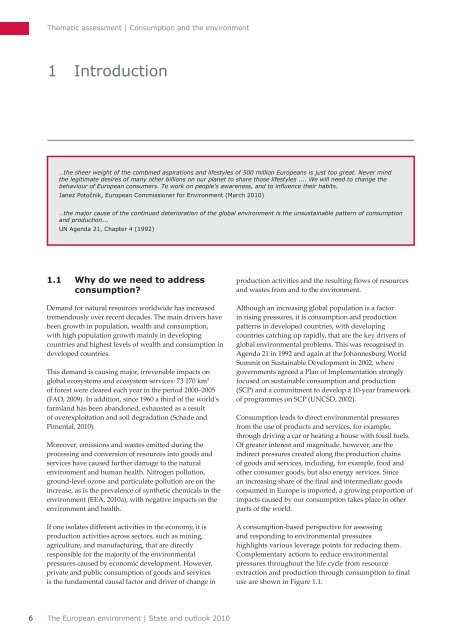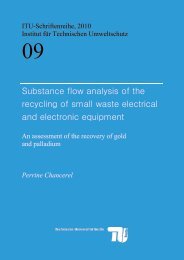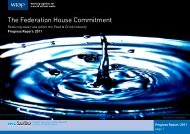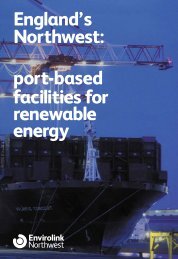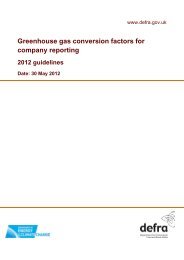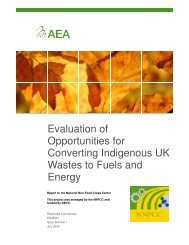Consumption and the environment (SOER2010) - European ...
Consumption and the environment (SOER2010) - European ...
Consumption and the environment (SOER2010) - European ...
Create successful ePaper yourself
Turn your PDF publications into a flip-book with our unique Google optimized e-Paper software.
Thematic assessment | <strong>Consumption</strong> <strong>and</strong> <strong>the</strong> <strong>environment</strong><br />
1 Introduction<br />
…<strong>the</strong> sheer weight of <strong>the</strong> combined aspirations <strong>and</strong> lifestyles of 500 million <strong>European</strong>s is just too great. Never mind<br />
<strong>the</strong> legitimate desires of many o<strong>the</strong>r billions on our planet to share those lifestyles .... We will need to change <strong>the</strong><br />
behaviour of <strong>European</strong> consumers. To work on people's awareness, <strong>and</strong> to influence <strong>the</strong>ir habits.<br />
Janez Potočnik, <strong>European</strong> Commissioner for Environment (March 2010)<br />
…<strong>the</strong> major cause of <strong>the</strong> continued deterioration of <strong>the</strong> global <strong>environment</strong> is <strong>the</strong> unsustainable pattern of consumption<br />
<strong>and</strong> production...<br />
UN Agenda 21, Chapter 4 (1992)<br />
1.1 Why do we need to address<br />
consumption?<br />
Dem<strong>and</strong> for natural resources worldwide has increased<br />
tremendously over recent decades. The main drivers have<br />
been growth in population, wealth <strong>and</strong> consumption,<br />
with high population growth mainly in developing<br />
countries <strong>and</strong> highest levels of wealth <strong>and</strong> consumption in<br />
developed countries.<br />
This dem<strong>and</strong> is causing major, irreversible impacts on<br />
global ecosystems <strong>and</strong> ecosystem services: 73 170 km 2<br />
of forest were cleared each year in <strong>the</strong> period 2000–2005<br />
(FAO, 2009). In addition, since 1960 a third of <strong>the</strong> world's<br />
farml<strong>and</strong> has been ab<strong>and</strong>oned, exhausted as a result<br />
of overexploitation <strong>and</strong> soil degradation (Schade <strong>and</strong><br />
Pimental, 2010).<br />
Moreover, emissions <strong>and</strong> wastes emitted during <strong>the</strong><br />
processing <strong>and</strong> conversion of resources into goods <strong>and</strong><br />
services have caused fur<strong>the</strong>r damage to <strong>the</strong> natural<br />
<strong>environment</strong> <strong>and</strong> human health. Nitrogen pollution,<br />
ground-level ozone <strong>and</strong> particulate pollution are on <strong>the</strong><br />
increase, as is <strong>the</strong> prevalence of syn<strong>the</strong>tic chemicals in <strong>the</strong><br />
<strong>environment</strong> (EEA, 2010a), with negative impacts on <strong>the</strong><br />
<strong>environment</strong> <strong>and</strong> health.<br />
If one isolates different activities in <strong>the</strong> economy, it is<br />
production activities across sectors, such as mining,<br />
agriculture, <strong>and</strong> manufacturing, that are directly<br />
responsible for <strong>the</strong> majority of <strong>the</strong> <strong>environment</strong>al<br />
pressures caused by economic development. However,<br />
private <strong>and</strong> public consumption of goods <strong>and</strong> services<br />
is <strong>the</strong> fundamental causal factor <strong>and</strong> driver of change in<br />
production activities <strong>and</strong> <strong>the</strong> resulting flows of resources<br />
<strong>and</strong> wastes from <strong>and</strong> to <strong>the</strong> <strong>environment</strong>.<br />
Although an increasing global population is a factor<br />
in rising pressures, it is consumption <strong>and</strong> production<br />
patterns in developed countries, with developing<br />
countries catching up rapidly, that are <strong>the</strong> key drivers of<br />
global <strong>environment</strong>al problems. This was recognised in<br />
Agenda 21 in 1992 <strong>and</strong> again at <strong>the</strong> Johannesburg World<br />
Summit on Sustainable Development in 2002, where<br />
governments agreed a Plan of Implementation strongly<br />
focused on sustainable consumption <strong>and</strong> production<br />
(SCP) <strong>and</strong> a commitment to develop a 10-year framework<br />
of programmes on SCP (UNCSD, 2002).<br />
<strong>Consumption</strong> leads to direct <strong>environment</strong>al pressures<br />
from <strong>the</strong> use of products <strong>and</strong> services, for example,<br />
through driving a car or heating a house with fossil fuels.<br />
Of greater interest <strong>and</strong> magnitude, however, are <strong>the</strong><br />
indirect pressures created along <strong>the</strong> production chains<br />
of goods <strong>and</strong> services, including, for example, food <strong>and</strong><br />
o<strong>the</strong>r consumer goods, but also energy services. Since<br />
an increasing share of <strong>the</strong> final <strong>and</strong> intermediate goods<br />
consumed in Europe is imported, a growing proportion of<br />
impacts caused by our consumption takes place in o<strong>the</strong>r<br />
parts of <strong>the</strong> world.<br />
A consumption-based perspective for assessing<br />
<strong>and</strong> responding to <strong>environment</strong>al pressures<br />
highlights various leverage points for reducing <strong>the</strong>m.<br />
Complementary actions to reduce <strong>environment</strong>al<br />
pressures throughout <strong>the</strong> life cycle from resource<br />
extraction <strong>and</strong> production through consumption to final<br />
use are shown in Figure 1.1.<br />
6<br />
The <strong>European</strong> <strong>environment</strong> | State <strong>and</strong> outlook 2010


